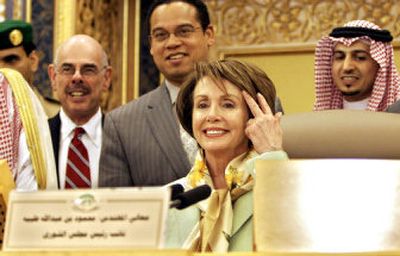Pelosi stops by Saudi council

RIYADH, Saudi Arabia – U.S. House Speaker Nancy Pelosi visited Saudi Arabia’s unelected advisory council Thursday, the closest thing in the kingdom to a legislature, where she tried out her counterpart’s chair – a privilege no Saudi woman can have because women cannot become legislators.
Pelosi, the first woman speaker of the House, said she raised the issue of Saudi Arabia’s lack of female politicians with Saudi government officials on the last stop of her Mideast tour, but she refrained from criticizing the kingdom over it.
Pelosi later sidestepped a question on how she felt about the absence of female Saudi council members, saying: “I am very pleased that after 200-plus years in the U.S. we finally have a speaker. It took us a long time.”
Asked if she raised the issue at Thursday’s meeting with the council members, she said: “The issue has been brought up in our discussions with the Saudis on this trip.”
The Majlis al-Shura, or consultative council, was expanded and given more powers in 1992 as a gesture toward forming a legislature. Its 150 members are chosen by the king and advise him, and the body has the power to propose new laws for the government’s approval.
Saudi King Abdullah has spoken of reform in this key U.S. ally, but change has been slow and limited. The kingdom, ruled by the strict Wahhabi interpretation of Islam, held its first elections in 2005, choosing local councils. Women were barred from voting or running.
Pelosi arrived in Saudi Arabia on Wednesday, meeting with Abdullah at his farm outside Riyadh.
Earlier Wednesday, she met in Damascus with Syrian President Bashar Assad, bringing a sharp rebuke from the White House. The Bush administration said the visit undermined its policy of isolating Syria, which it accuses of supporting terrorism.
Pelosi and her delegation – which included a House Republican – aimed to challenge the policy, arguing that talking with Damascus is the only way to push it to change its ways. Another Republican congressman, Darrell Issa, met with Assad on Thursday, the latest in a string of lawmakers from both parties who have made the trip in recent months.
In Saudi Arabia, Pelosi and King Abdullah discussed at length the Arab peace initiative, which was proposed by Saudi Arabia in 2002 and was relaunched at a summit in Riyadh last week.
The initiative offers Israel peace with all Arab states if it withdraws from lands seized in 1967 and allows the creation of a Palestinian state with its capital in east Jerusalem. Israel has said it would only accept the proposal if some changes were made – particularly over the issue of refugees – but Arab nations have said Israel should accept it as a basis for negotiations.
Pelosi was welcomed at the Shura council by its head, Sheik Saleh bin Humaid, who is also the imam of the Grand Mosque in Mecca. He placed his right hand on his chest in a traditional Arab greeting, since conservative Islamic clerics don’t shake hands with women, and she returned the greeting in a similar manner.
During her meetings, Pelosi did not wear the long black robe, or abaya, and head scarf that Saudi and non-Saudi women have to wear in the kingdom. Visiting female dignitaries are not expected to wear it.